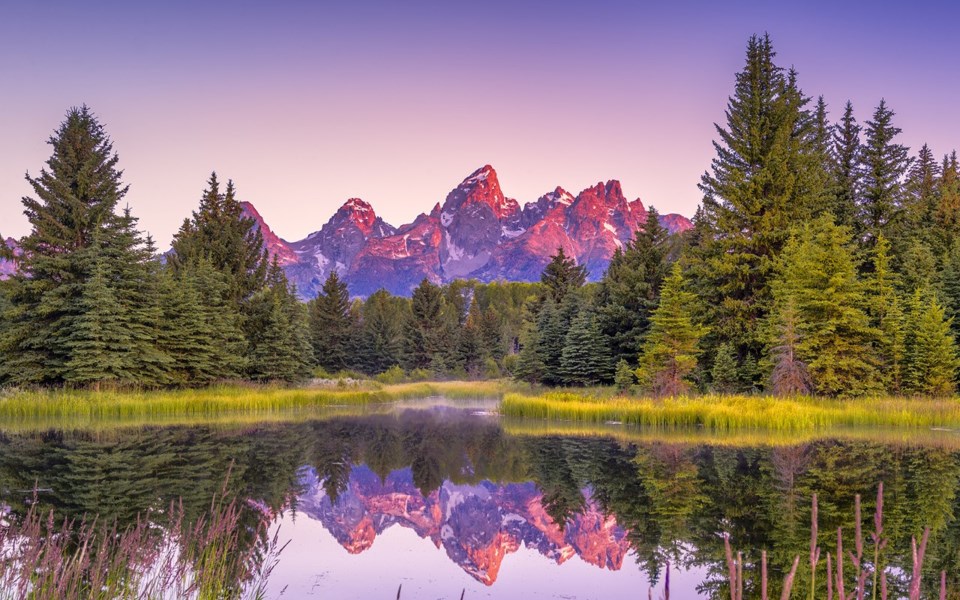JACKSON, Wyo.—People in Teton County may have a cowboy atop a bucking bronco on their license plates, the same as others in Wyoming, but in almost every other respect they're outliers.
Consider the last presidential election. Alone among Wyoming's 23 counties, voters in Teton County —otherwise known as Jackson Hole—sided with Hillary Clinton. Nearly all other counties gave 70 to 90 per cent of their votes to Donald Trump.
Wyoming is conservative and Republican, while Teton County veers Democratic and liberal. This is just the beginning of the many differences.
These differences have been reflected several times recently in efforts, some successful, by state legislators from elsewhere in Wyoming to slap the hands of Teton County officials for what they call regulatory overreach.
The Jackson Hole News&Guide's Allie Gross cited the example of family subdivisions. Just three per cent of Teton County is in private ownership, and those ranchlands are treasured preserves. By Wyoming law, family members can deed parcels to other family members without restrictions imposed on others. Teton County believed this exemption was being used for speculative real estate purposes, not the purpose for which it was intended. The county adopted regulations that required minimum land parcel sizes of 35 acres.
That 35 acres is the minimum in Colorado. Other states in the West have similar laws of 35 to 40 acre minimums. But Wyoming views private property rights as sacred.
Ogden Driskill, a state senator from northeastern Wyoming, said Teton County has overreached in telling people what they can do with their land. "I'm a private landowner-rights person," he said. "And a lot of what's happening in Teton County may be very popular to the public, but it's an absolute affront to private property rights."
Along with other legislators, Driskill approved a law this winter that requires Teton County to issue building permits for exempt family subdivisions, no matter the parcel size.
Another disagreement is about Teton County's affordable housing regulations.
There's irony in this, as was noted by state Rep. Jim Roscoe, an independent that represents parts of Teton County. "It's almost a plank of the Republican platform that government closest to the people is the best government," he pointed out.
County Commissioner Greg Epstein cites many differences between Teton County and other Wyoming counties.
"The way we raise revenue is the opposite end of the spectrum from the rest of the state. We are growing, (while) a lot of the rest of the state is trying to retain citizens," he said. "I don't think the state legislators from other parts of the state truly understand the nuance and dynamics of what it takes to be citizens of Jackson Hole and Teton County and be a public servant trying to make this all work. We're dealing with real urbanization issues in a fragile ecosystem."
Epstein and another Teton County commissioner, Luther Propst—the founder of the Sonoran Institute—said that Teton County's unusual circumstances require more complex and usually more restrictive land-use regulations.
Some Wyoming counties have no zoning at all. In that view, Teton County's regulations represent overreach, maybe even oppression.
In Wyoming, as in other states, towns that have adopted home-rule charters have more independence from state regulations.
Other states have similar dynamics as found in Wyoming. The flags of Blaine County, home to Ketchum and Sun Valley, frequently wave in different directions from Idaho's 44 other counties. In the last presidential election, just Blaine and the county where the state university is located went for Clinton.
In Utah, it's Park City and Summit County that frequently walk in a different direction than the rest of Utah. In this, Summit County often has the company of Salt Lake City and sometimes Moab. For example, until recently, the Mormon-dominated legislature required that alcoholic drinks be prepared behind a curtain.
Colorado hews more purple verging on blue in its politics. But the politics of local vs. state control has flared for decades, most notably in the debates about regulation of oil and gas extraction.
South of Durango, natural gas extraction has been contested since the 1980s. As the Denver Post pointed out, the Colorado Supreme Court ruled in 1992 that there was nothing in state law to support the total preemption of a county's authority to approve oil and gas land-use regulations.
However, as the drilling hot spot has moved to the northern Front Range in recent years, cities and counties that have tried to regulate drilling have been less successful. Good deal, responded the oil and gas industry and local governments who favor the extraction. Let the state be the regulator.
Now, a bill advancing rapidly through the Democratic-controlled Legislature would give those cities and counties much of the land-use authority that they have wanted. This time, it's the oil and gas industry and its allies who see ruination lying just over the legislative horizon. In Weld County, the centre of the drilling, some firebrands have called for the county to leave Colorado and join Wyoming.




